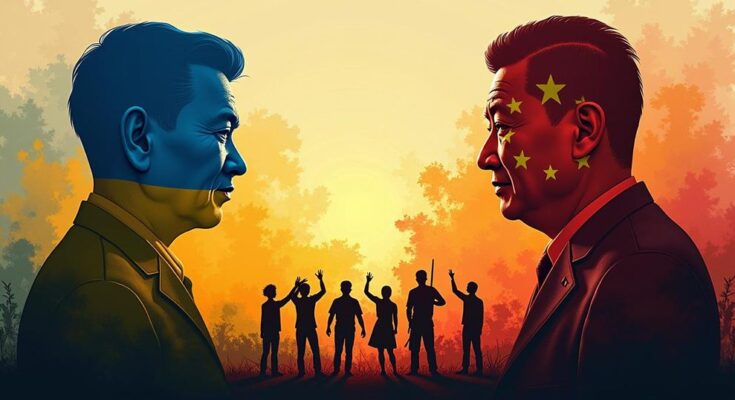China and Brazil convened a meeting at the UN General Assembly to push for a peace initiative regarding the Ukraine conflict, despite strong objections from Ukrainian President Zelenskiy. Seventeen nations attended, with a focus on preventing escalation and supporting a peace conference involving Russia and Ukraine. Zelenskiy’s dismissal of the initiative raises concerns over its potential to empower Moscow. Amorim of Brazil maintains their non-partisan stance, advocating for peace.
In a resolute effort to garner support from developing nations for a peace initiative concerning the ongoing conflict in Ukraine, China and Brazil conducted a meeting during the United Nations General Assembly. This initiative is notable in the face of Ukrainian President Volodymyr Zelenskiy’s outright rejection, who perceives the proposal as overly favorable to Moscow. The meeting convened seventeen nations, presided over by China’s Foreign Minister Wang Yi and Brazilian foreign policy advisor Celso Amorim. Wang Yi articulated the necessity to avert further escalation of hostilities in Ukraine, emphasizing the critical avoidance of nuclear threats and safeguarding nuclear facilities. He reiterated the geographical and historical ties between Russia and Ukraine, stating that “amity is the only realistic option,” and called for international support in arranging a peace conference that would include both nations. Alongside Brazil and China, representatives from ten other Global South countries, including Indonesia, South Africa, and Turkey, collectively endorsed a communique that further develops a previously established six-point peace plan initiated by these nations in May. Amorim indicated the intention to maintain ongoing discussions under the auspices of a coalition dubbed the “friends for peace.” It is pertinent to highlight that Chinese President Xi Jinping had entered into a comprehensive partnership with Russian President Vladimir Putin shortly before the onset of the military conflict in Ukraine. While China maintains its stance of not supplying arms to Russia, Western nations assert that Chinese firms are contributing materials critical to Russian military operations. President Zelenskiy, in his address earlier in the assembly, expressed concern regarding the motives behind China’s and Brazil’s alternative proposals, suggesting that such approaches could inadvertently empower Moscow by granting it diplomatic breathing room. In response to Zelenskiy’s remarks, Amorim stated, “I am not here to respond either to Zelenskiy or Putin, just to propose a way for peace.”
The conflict in Ukraine, which commenced with Russia’s military intervention in February 2022, has prompted various international actors to seek resolution pathways. The dynamics surrounding peace negotiations are highly complex, involving both the perspectives of the conflicting parties and the broader implications of global geopolitics. China and Brazil, representing key players from the Global South, have positioned themselves in this discourse, seeking to advocate for a peace framework that resonates with developing countries while navigating the delicate balance of international relations, particularly with major powers involved in the conflict.
In summary, China and Brazil are pursuing a collective peace initiative aimed at resolving the Ukraine conflict, despite opposition from President Zelenskiy, who accuses them of undermining established peace efforts. This undertaking reflects broader efforts among developing nations to influence the discourse surrounding international conflict resolution. The subsequent discussions are poised to shape the future of diplomatic engagements related to this enduring crisis.
Original Source: www.usnews.com




